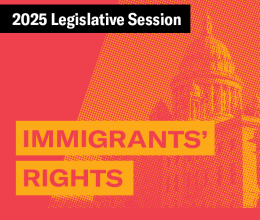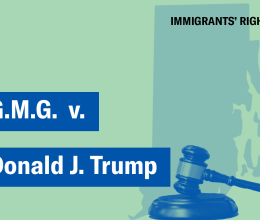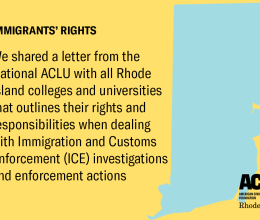A federal court in Rhode Island has ruled that the ACLU can proceed with a lawsuit on behalf of a North Providence resident who has twice been held in prison as a deportable “alien” even though she is a U.S. citizen. The court ruling holds that there are critical constitutional limits on the power of immigration and corrections officials to detain people while investigating their immigration status.
Ada Morales, who was born in Guatemala and became a naturalized United States citizen in 1995, was taken into custody on criminal charges in May 2009. While she was being held at the ACI, Immigration and Customs Enforcement (ICE) officials lodged an “immigration detainer” against her – apparently assuming, based on her race and her place of birth, that she was a deportable non-citizen. A judge had ordered Ms. Morales released, but the R.I. Department of Corrections held her in custody for an additional 24 hours solely because of the ICE detainer, and even after she repeatedly told officials she was a U.S. citizen and offered to show them her naturalization certificate and passport. The detention, the ACLU lawsuit alleges, violated her constitutional rights to equal protection of the law and freedom from unreasonable searches and seizures.
In an opinion issued late yesterday, U.S. District Judge John J. McConnell, Jr. agreed that the ACLU had raised viable claims, holding, among other things, that Ms. Morales “has set forth plausible allegations that she was unconstitutionally detained solely based on her national origin and Hispanic last name.”
Among the court’s major conclusions:
- The Fourth Amendment doesn’t permit ICE or state officials to hold someone in jail merely to investigate their immigration status; an arrest must be based on probable cause, not mere investigative interest.
- ICE cannot detain someone simply because he or she was born abroad. “To hold otherwise,” said the Court, “would mean that the approximately 17 million foreign-born United States citizens could automatically be subject to detention and deprivation of their liberty rights.”
- Ms. Morales has standing to seek an injunction forbidding the federal government from detaining her in the future. The Court noted that she had been held on a detainer on two occasions, even though she’s a naturalized US citizen, and so “it is not difficult to understand why Ms. Morales fears being illegally detained again.”
- The Department of Corrections cannot rely solely on immigration detainers, which are issued without any judicial review, to hold an individual in custody for deportation purposes once state or local custody ends. Detainers are merely requests, not orders, and as a result, the director of the R.I. Department of Corrections may be held responsible for holding Ms. Morales in jail based solely on the issuance of a detainer.
“I’m very happy that the court has recognized my rights,” Ms. Morales said today. Referring to her 2009 experience, she noted, “Rhode Island officials just assumed they could hold me because of my Guatemalan background and the color of my skin.” An ICE official later apologized to Ms. Morales for her wrongful detention, but acknowledged that it could happen again, as it had once before.
ACLU of Rhode Island executive director Steven Brown remarked: “We hope that this ruling will encourage state officials to think twice before taking on the role of federal immigration enforcers. No innocent person should fear spending time in jail because of shortcuts taken by correctional and immigration officials in their unseemly zeal to deport people.”
Lena Graber, volunteer attorney for the National Immigration Project of the National Lawyers’ Guild, said: "The Court recognized that indiscriminately issuing detainers based on foreign birth does not meet the requirements of our Constitution, and reaffirmed the bedrock Fourth Amendment rule that mere investigation is not a valid basis to detain someone.”
National ACLU attorney Kate Desormeau added: "The Court has affirmed that ICE detainers are simply ‘requests,’ not mandatory orders, and that state and local officials can be held responsible if they choose to enforce them in violation of the law. The court’s decision stands as a reminder that law enforcement agencies cannot abdicate their responsibility to abide by the Constitution."
Besides Desormeau and Graber, the suit is being handled by ACLU of RI volunteer attorney Mark Freel from the law firm of Edwards Wildman Palmer LLP, and National ACLU Immigrant Rights Project attorneys Omar Jadwat and Orion Danjuma.






